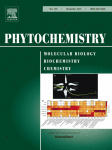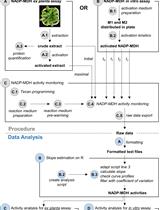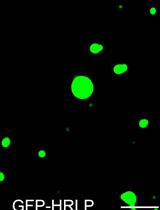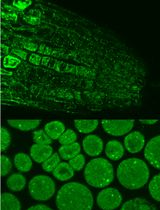- EN - English
- CN - 中文
Microplate Assay to Study Carboxypeptidase A Inhibition in Andean Potatoes
采用微孔板分析法研究安第斯土豆中羧基肽酶的抑制作用
(*contributed equally to this work) 发布: 2016年12月05日第6卷第23期 DOI: 10.21769/BioProtoc.2032 浏览次数: 10215
评审: Arsalan DaudiManjula MummadisettiDaniel F. Caddell
Abstract
Metallocarboxypeptidases (MCP) are zinc-dependent exopeptidases that catalyze the hydrolysis of C-terminal amide bonds in proteins and peptides. They are involved in a wide range of physiological processes and have recently emerged as relevant drug targets in biomedicine (Arolas et al., 2007). In this context, the study and discovery of new MCP inhibitors from plants constitute a valuable approach for the development of new therapeutic strategies. Herein we describe a simple and accessible microplate method for the study of the specific and dose-response carboxypeptidase A inhibitory activities present in Andean potato tubers. Our protocol combines an extraction method optimized for small protein inhibitors in plant tissues, with the measurement of enzyme kinetics using a microplate reader. These instruments are capable of reading small sample volumes, for many samples in a very short time-frame, therefore reducing the time and costs of high-throughput screening experiments. Although this protocol describes the study of Andean potatoes, our approach is also applicable to the analysis other plant samples.
Keywords: Metallocarboxypeptidase (金属羧肽酶)Background
In higher plants, small proteinaceous protease inhibitors are wound-induced molecules produced as a part of its defense system against insect attack (Graham et al., 1981; Villanueva et al., 1998). Among the studied inhibitors, only two are specific for MCP, i.e., the potato carboxypeptidase inhibitor (PCI) and its close homolog found in tomato plants (TCI). Over the last few decades, the presence of MCP inhibitors in Solanaceae has been extensively reported, revealing potato (Solanum tuberosum) as one of the most important sources of MCP inhibitors (Hass et al., 1979; Obregón et al., 2012; Lufrano et al., 2015). In humans, MCP action is exquisitely regulated and dysregulation of its function might lead to disease or even to cell death (Arolas et al., 2007). In fact, MCP have been associated with human pathologies such as acute pancreatitis (Appelros et al., 1998), diabetes (Cool et al., 1997), several types of cancer (Ross et al., 2009; Sun et al., 2016; Abdelmagid et al., 2008; Tsakiris et al., 2008), fibrinolysis (Valnickova et al., 2007), inflammation (Deiteren et al., 2009) or neurodegeneration (Rogowski et al., 2010). In this context, there is an interest in the discovery of new MCP inhibitors, and thus we focus our studies in potatoes that are native from the Andean region of South America. In this region, thousands of different potato varieties coexist, constituting a natural reservoir for the discovery of novel MCP inhibitors (Figure 1).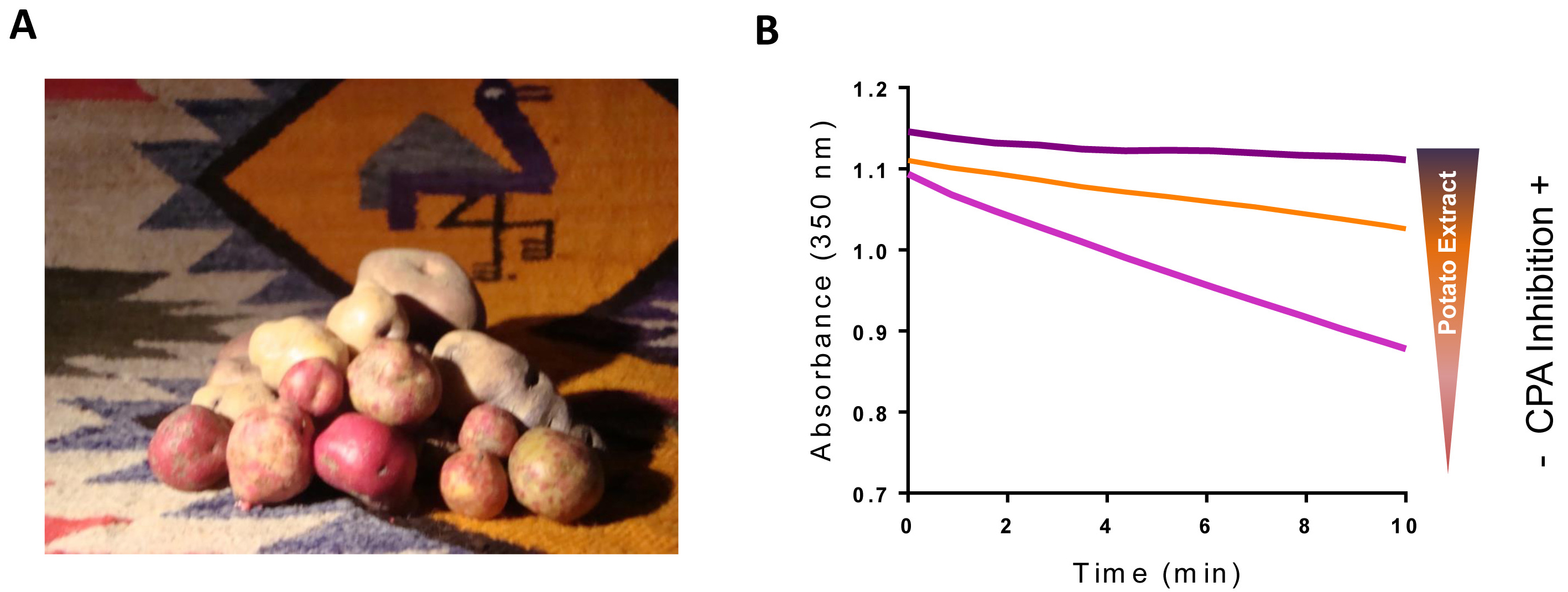
Figure 1. Andean potatoes and potato extract CPA inhibitory activity. A. Picture displaying the large number of potato varieties found within the Andean region. Currently in this region coexist thousands of Andean varieties of Solanum tuberosum (Machida-Hirano, 2015; Clausen et al., 2010). B. Effects of potato extracts on bCPA activity. The activity of bovine CPA (bCPA) was measured using the substrate N-(4-methoxyphenylazoformyl)-Phe-OH determining the decrease in absorbance at 340 nm in function of the time. Due to its high content in MCP inhibitors, the addition of potato extract to the reaction decreases the rate of substrate hydrolysis in a dose-response manner.
Here, we describe a simple protocol to determine the specific and dose-response carboxypeptidase A inhibitory activity present in Andean potatoes and in other biological extracts using microplates. The major advantage of this protocol over other available approaches (Yanes et al., 2007) is that the use of microplates allows multiple enzymatic measurements to be done in a single experiment, therefore reducing the time and costs.
Materials and Reagents
- 50 ml tubes
- 96-well microplates, clear flat bottom (Corning, catalog number: 3364 )
- Syringe filters, 0.45 μm pore size (EMD Millipore, catalog number: SLHP033RS )
- Potato tubers
- General laboratory materials and instrumentation (e.g., micropipettes, microtubes, tips)
- Bradford assay kit, e.g., Coomassie Plus Assay Kit (Thermo Fisher Scientific, Thermo ScientificTM, catalog number: 23236 )
- Bovine serum albumin (BSA)
- N-(4-methoxyphenylazoformyl)-Phe-OH·potassium salt (Bachem, catalog number: M-2245 )
- Trizma® base (Sigma-Aldrich, catalog number: T1503 )
- Sodium chloride (NaCl) (Sigma-Aldrich, catalog number: S7653 )
- Hydrochloric acid (HCl) (Sigma-Aldrich, catalog number: 258148 )
- Dimethyl sulfoxide (DMSO) (Sigma-Aldrich, catalog number: D4540 )
- Bovine carboxypeptidase A (bCPA) (Sigma-Aldrich, catalog number: C9268 )
- Carboxypeptidase A reaction buffer/Extraction buffer (see Recipes)
- 2 mg/ml bCPA stock solution (see Recipes)
- 10x bCPA working solution (see Recipes)
- 1,000x substrate stock solution (see Recipes)
- 10x substrate working solution (see Recipes)
Equipment
- Laboratory blender or equivalent (Oster, catalog number: 004093-008-NP0 )
- Refrigerated centrifuge (suitable for volumes of 50 ml) (Beckman Coulter, model: Avanti J-26 XPI )
- UV-Vis microplate spectrophotometer system capable of operating at 340 and 595 nm (e.g., PerkinElmer, model: Victor X 2030-0050 or other equivalent spectrophotometer)
- pH meter (HACH LANGE SPAIN, Crison, model: GLP 21 )
- 37 °C oven (e.g., Thermo Fisher Scientific, Thermo ScientificTM, model: Heratherm Compact Microbiological Incubator )
- Multichannel pipette (e.g., Technology Networks, model: CappAero Multichannel Pippete 25-200 μl )
Software
- GraphPad Prism 5 software (GraphPad Software, Ing USA)
Procedure
文章信息
版权信息
© 2016 The Authors; exclusive licensee Bio-protocol LLC.
如何引用
Tellechea, M. E., Garcia-Pardo, J., Cotabarren, J., Lufrano, D., Bakas, L., Avilés, F. X., Obregon, W. D., Lorenzo, J. and Tanco, S. (2016). Microplate Assay to Study Carboxypeptidase A Inhibition in Andean Potatoes. Bio-protocol 6(23): e2032. DOI: 10.21769/BioProtoc.2032.
分类
植物科学 > 植物生物化学 > 蛋白质 > 活性
植物科学 > 植物分子生物学 > 蛋白质
生物化学 > 蛋白质 > 活性
您对这篇实验方法有问题吗?
在此处发布您的问题,我们将邀请本文作者来回答。同时,我们会将您的问题发布到Bio-protocol Exchange,以便寻求社区成员的帮助。
Share
Bluesky
X
Copy link







